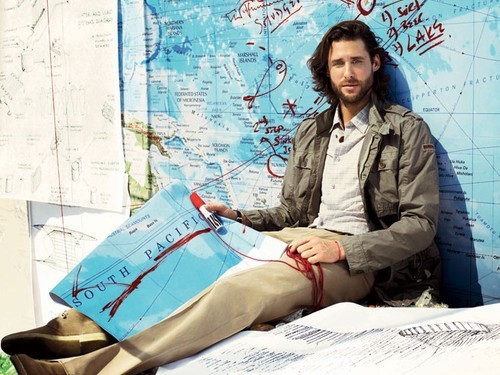Rothschild delays Plastika sail across the Pacific
by BW Media round-up on 12 Apr 2009

David de Rothschild in planning mode SW
Billionaire banking heir David de Rothschild has had to delay his extraordinary journey in a plastic bottle boat called Plastiki from San Francisco to Sydney because of 'teething problems'(See original story).
Originally meant to depart on 28th April, exactly 62 years after his hero Thor Heyerdahl set out on his epic journey, the boat will now set off 'later this summer' according to de Rothschild.
The purpose of the journey is to highlight the floating plastic of the North Pacific Gyre, the enormous 'garbage patch' caught up in the swirling Pacific Ocean currents and now as large as France or Texas.
In spite of the delay, de Rothschild insists his craft will sail in the next few weeks and could one day revolutionise the use of recycled plastics in general and the design of boats in particular. Much will depend on how his craft behaves once the Plastiki expedition is under way, he admitted to the New Yorker recently. His craft should perform well, but could break up, he said.
'These are just unknowns,' he told reporters. 'That's an adventure! If it was planned and everyone knew, no one would be interested.'
The garbage patch, which has been the subject of much debate, even disbelief, because of the size and horror of its existence, lies north-west of Hawaii. It was discovered in 1999 by Oceanographer Charles Moore who found that its waters contained tens of thousands of pieces of plastic per square mile, the remains of rubbish caught in the region's circulating ocean currents. This pollution is now devastating populations of seabirds and fish that live in the region.
During his trip, de Rothschild will collect water samples and post blogs, photographs and video clips of the area, in an attempt to publicise the perils posed by plastic pollution.
The 30-year-old environment crusader has designed his special catamaran with a hull made of frames filled with 12,000 plastic bottles. The cabin and bulkheads of Plastiki have also been constructed out of a special recycled material called srPET, made of webs of plastic.
'The plastic water bottle epitomises everything about this throwaway, disposable society,' said de Rothschild, who trained to be a showjumper in England and who has trekked to both the north and south poles. However, he added that he was not aiming to demonise plastic, but was trying to highlight its alternative uses, as well as focusing global attention on the dangers posed to the ecology in regions such as the Great Pacific Garbage Patch.
When it is ready, the Plastiki will carry de Rothschild and a crew of six on a 10,500-mile journey from San Francisco to Hawaii, Midway Island, Bikini Atoll, Vanuatu and, finally, Sydney. There will be no accompanying craft, but the Plastiki will be met by a support team at each landfall.
The destinations for the craft's great voyage have been selected to highlight a variety of environmental threats, including overfishing and climate change. However, the most important part of Plastiki's route will be its voyage round the Great Pacific Garbage Patch in the Pacific, where it will focus global awareness on the issue of marine debris and pollution.
Fish and seabirds mistake plastic for food and choke to death. At the same time, plastics absorb pollutants including PCBs (polychlorinated biphenyls) and pesticides, bringing poisons into the food chain.
In one study of plastic pollution in the Pacific, scientists found that populations of albatrosses in the north-west Hawaiian islands, a national marine sanctuary, have been devastated by plastic from the garbage patch. 'Their body cavities are full of huge chunks of many types of plastics, from toothbrushes to bottle caps to needles and syringes,' said Myra Finkelstein, an environmental toxicologist based at University of California, Santa Cruz. 'They can't get them up. They can't get them out. It's heartbreaking.'
de Rothschild insists his project is seeking not just to show up the planet's ecological woes but, through the design and construction of Plastiki, he will also be highlighting how disposable plastics can be used in a constructive way.
'I want the Plastiki to make a statement that it's our lack of reuse, uses and disposal that it is at fault, not the material itself,' he said.
David de Rothschild regularly appears in Tatler's list of Britain's most eligible bachelors. He is also known as one of the country's leading 'eco-toffs', those young men and women who use their inherited wealth to promote environmental causes.
If you want to link to this article then please use this URL: www.sail-world.com/55744